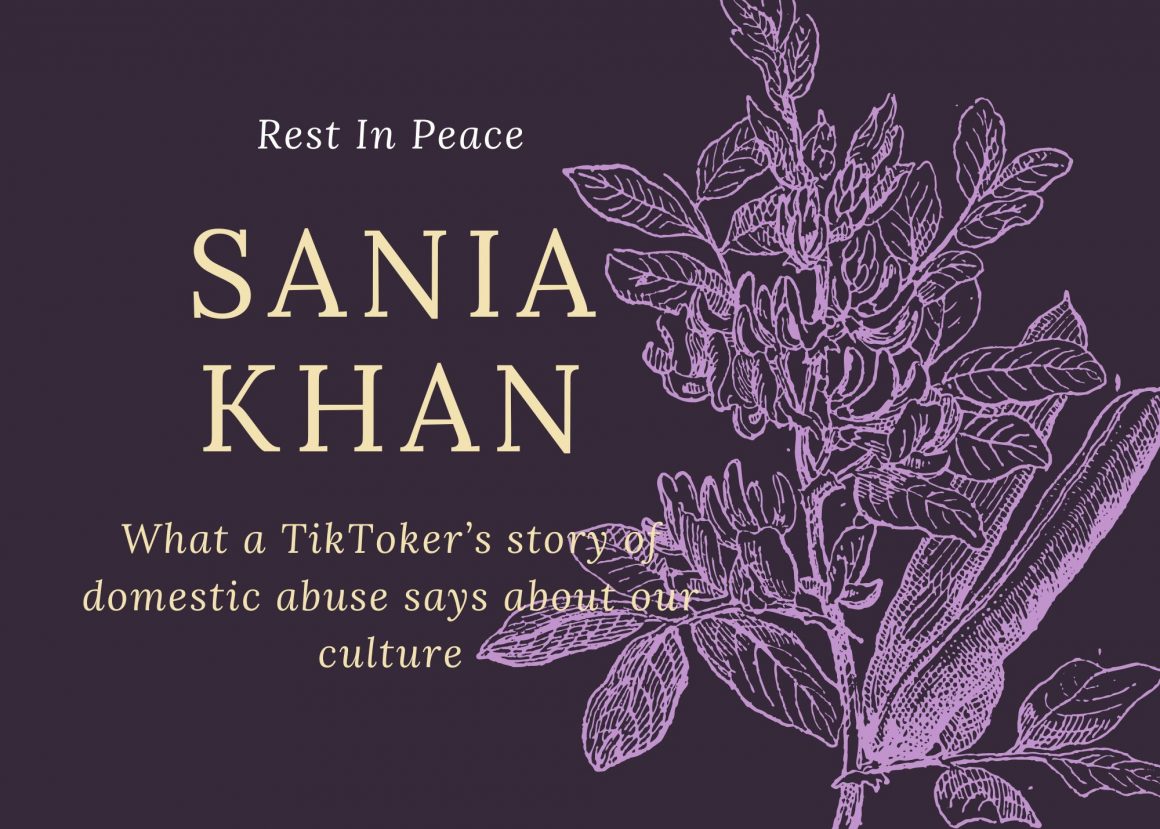
In feminism we trust? What a TikToker’s story of domestic abuse says about our culture
By Anabel Selemon, September 16 2022—
July 18 saw the tragic death of 29 year old Pakistani-American photographer, Sania Khan, shot dead by her estranged husband, Raheel Ahmad — who promptly took his own life. Both were found unresponsive in Khan’s Chicago home, with her death ruled as a murder-suicide. Khan developed a sizable following on TikTok as the first generation child of Pakistani Muslim immigrants, alongside an outspoken critic of divorce and domestic violence stigma within the South Asian community. While her story unfolded to be an utter tragedy, she spurred social media debate surrounding the stigmatization of divorced and abused women within South Asian communities and at large.
On TikTok, Khan spoke openly about her struggles post-divorce, particularly the backlash she received from her community members for seeking a divorce from a relationship the photographer described as “toxic.”
“Going through a divorce as a [South Asian] woman feels like you failed at life sometimes,” said Khan in one video describing her struggles. “The way the community labels you, the lack of emotional support you receive, and the pressure to stay with someone because “what will they say” is isolating […] it makes it harder for women to leave marriages that shouldn’t have been in to begin with.”
Khan was even told her divorce “would be letting shaytan win,” alluding to her actions being a victory for the devil.
Her death prompted a response from Neha Gill, the executive director of Apna Ghar, a human rights organization based out of Chicago that is focuses on gender-based violence, particularly in South Asian communities.
“In South Asian communities, there’s this concept of saving face and preserving family honor — not bringing shame to the family,” Gill told the Huffington Post. “Those things are prioritized over an individual’s safety.”
Through this lens, Khan’s divorce and subsequent advocacy could be interpreted as having brought shame to her family by disrupting the facade of paradise in her marital life and being open about the struggles she faced.
Stories like this occur close to home too. In 2019, a pair of sisters attending the University of Calgary were murdered by their father after being vocal online about their situation at home. Their story highlights how prevalent domestic violence is across our world and that it is not isolated to a particular part of the world, or any culture, but seeps into any community that does not allow space for victims to speak up.
This disturbing pattern of secrecy and saving face was explored in the film “Banaz: A Love Story,” which chronicled the life of Banaz Mahmoud, an Iraqi-Kurdish-British young woman who was forced into an arranged marriage with an older man, subsequently fraught with violence. When Mahmoud attempted to leave her marriage for a partner of her liking, she was murdered by her father and other male relatives, even after having alerted British police.
“If their own blood relatives discarded, betrayed, forgot and harmed them, then they are our children, our sisters our mothers that we will mourn, we will remember, we will honour their memory and we will not forget,” said Deeyah Khan, a Norwegian filmmaker of Afghan and Pakistani descent, when discussing why she made the film. She explained that she also experienced her own bouts of community-induced shame as a Muslim living in Europe.
It is important to note that while Khan’s death serves as a heartbreaking example of a legitimate broader issue of the difficulties of divorce and domestic abuse within her community, her story should not serve as an indignation of South Asian communities or Muslim communities as a whole. Domestic violence is a universal experience. This tragedy has rightfully sparked anger on behalf of the injustice Khan faced, but falling into stereotypes paints an entire community with an unjust broad brush.
In feminism we trust, but who do we leave behind? Khan’s story is a microcosm of victims, particularly women, not believed when they speak out and then silenced for taking a stand. Domestic abuse is a worldwide issue, existing in every corner of the world, in every culture, against every gender. The infamous #MeToo movement has sparked worldwide pushes to expel sexual harassment from the workplace and other facets of life, particularly against woman, and foster a culture of believing victims when they speak out.
While an important landmark in feminist history, the #MeToo movement ought to recognize the intersections of gender-based harassment and violence, and cultural communities where longstanding norms such as extremist religious traditions create unique challenges for victims. Sania Khan leaves behind a trailblazing legacy, unveiling a disturbing culture of silence regarding domestic abuse within her own community, and serves as a cautionary tale to the danger of dismissing a victim when they plead for help.
This article is a part of our Voices section.
